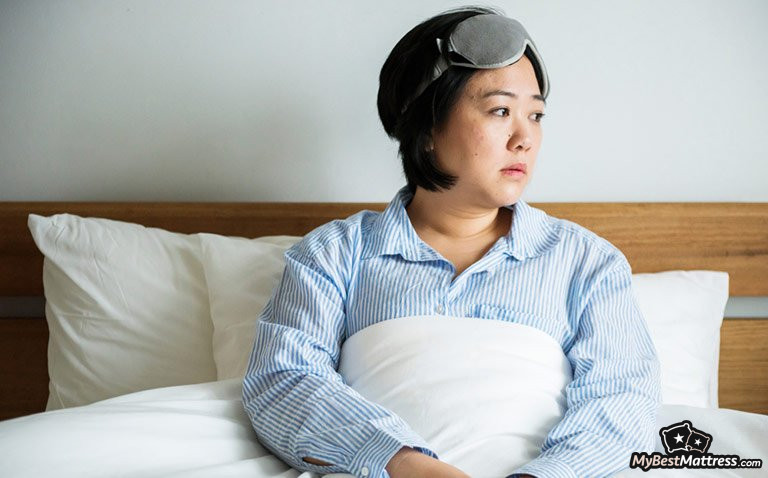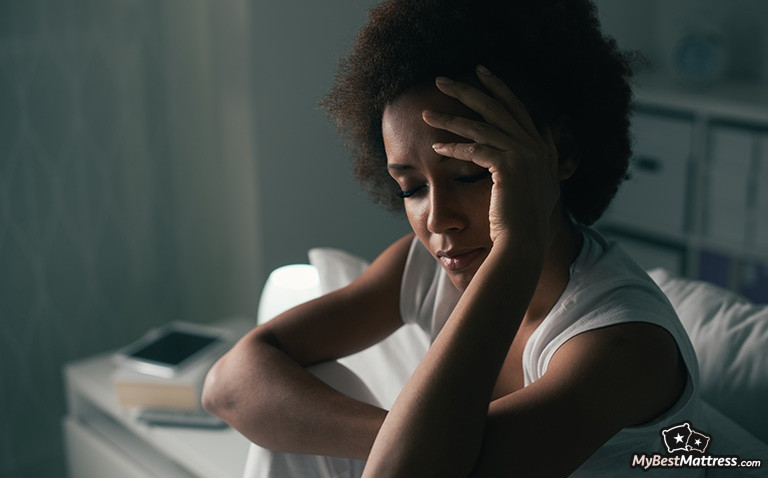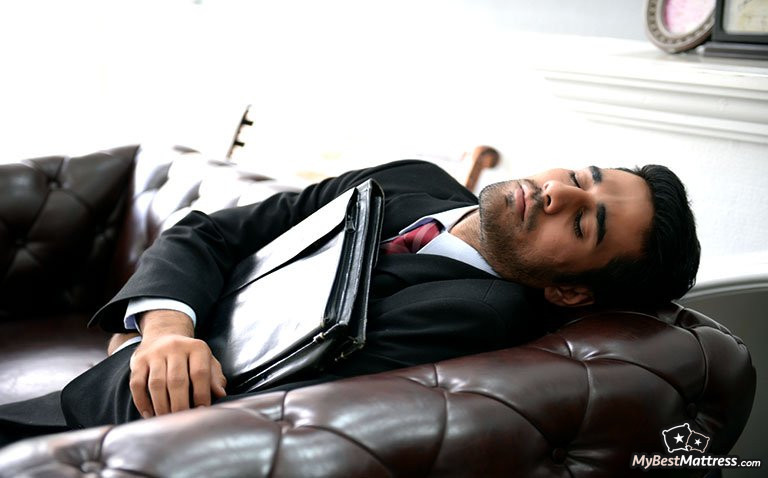
Insomnia and sleep deprivation is something that many of us have to deal with on a daily basis, however, the problem is that we don’t understand what impact the lack of sleep might have on us in the long run. Sleep deprivation can not only decrease our productivity and life satisfaction but also lead to serious health issues.
To find out how the lack of sleep can affect our mental and physical health, in this article, I’ll be focusing on questions, such as:
Can you die from lack of sleep?
What happens to our bodies when we don’t get enough sleep?
How long can you go without sleep before you die?
Since this article is related to health, we asked authorized doctors, health experts, sleep science, and nutrition coaches to answer these questions thoroughly. The majority of them have similar opinions on sleep deprivation.
Hence, all the information that you'll be able to find in this article is based on legit studies and doctors’ insights on the lack of sleep.
Table of Contents
What Happens to Our Body When We Don’t Sleep?
Sleep is fundamental for a person’s health and wellbeing. One could go longer without food than without sleep, which says a lot about the importance of quality rest. I would like to begin by finding out what processes are happening in our bodies when we don’t get sleep.
Jason Piper, the founder of Build Better Sleep and a certified sleep science and nutrition coach, claims that “Sleep is the yin to the yang of our bodies being awake.”. He says that the lack of sleep can imbalance our body functions and lead to:
- Increased blood pressure
- Increased blood sugar
- Unbalanced hormones
- Increased inflammation
- Poor cognition and decision making
- Weakened immune system
- Increased cortisol
- Increase in cancer developing
Tsao-Lin Moy, a Chinese medicine expert and acupuncturist, also claims that the lack of sleep leads to poor cognitive performance, meaning that we’ll find it difficult to think and concentrate. That being said, you might notice that your performance at school and work is getting worse if you’re not getting enough rest.
Dr. Elena Watson, MD Physician, also agrees that the lack of sleep affects our cognitive performance. She claims that if a person is not completing 8 hours of sleep, the human brain might temporarily shut down some of its parts, meaning that you could lose some of your senses. The doctor also says that people who are experiencing the lack of sleep could slip into a dream-like state.

Another issue that both Jason Piper and Tsao-Lin Moy distinguish is unbalanced hormones. When we sleep, our body and brain get into the recovery process and our body is producing growth hormones. However, if we don’t get enough sleep, our body is incapable of performing some vital processes.
Tsao-Lin Moy claims that low levels of growth hormone can lead to such issues as depression, mental fogginess, fatigue and chronic pain. People who are suffering from fibromyalgia, which are experiencing the same issues, also have low levels of growth hormone.
Moreover, since growth hormone plays a vital role in the repair of muscle, bone and the regulation of various metabolic functions, not getting enough sleep might lead to muscle weakness and impact your body later in life.
Dr. Jagdish Khubchandani, professor of health science claims that people who are not sleeping enough are more prone to obesity, stroke and diabetes, heart disease as well as mental health problems such as unstable moods, anxiety and even thoughts of suicide.
Therefore, by now you should understand how important sleep is to our mental and physical well-being. Not getting enough rest might lead to some serious health issues, however, the question is, can you die from lack of sleep? Let’s find out this answer in the further section.
Can You Die From Lack Of Sleep?
As far as it’s known there haven’t been any cases when someone died from lack of sleep. According to Jason Piper, it would be very unlikely to die directly from the lack of sleep.

He explains it like this: “Sleep is one of the body's primary drives. This means the body will seek it out just like hunger and thirst and oxygen. The brain will override systems and partake in microsleeps or cause you to zonk out eventually. The bigger danger is death by an automobile accident or long term, the loss in health that stems from lack of sleep like cardiovascular disease, cancer, or diabetes.“
Dr. Giuseppe Aragona, the general practitioner, claims that while not getting enough sleep won’t directly kill you, it might have effects on your body that could be fatal. Thus, if you’re wondering can you die from lack of sleep, you should know that it’s very unlikely to die directly from insufficient sleep, however, you can die from negative effects that sleep deprivation has on your body.
Dr. Patricia Celan, the Psychiatry resident at Dalhousie University in Canada, also believes that the lack of sleep cannot be the direct cause of death, however, she claims that it might lead to trouble concentrating, regulating your emotions, and worse - it can result in trouble with coordination.
Patricia Celan explains: “Reduced coordination can make driving as risky as it would be after a few drinks. This is because the brain shuts down in sections when you're sleep deprived but staying awake. If your brain is half-asleep while you're driving awake, that could lead to a car accident. After several days of sleep deprivation, you can start hallucinating, which may lead to other health and safety risks.”

Dr. Ghassan Kanj, who is a cardiovascular & pulmonary disease specialist in Chevy Chase, Maryland as well as a medical advisor for eMediHealth, explains how sleep deprivation could lead to death. Before getting right into it, you should know that he also has an amazing sense of humor. Here's how the doctor relates insomnia to death:
- If a man becomes irritatingly irritating, his wife may shoot him
- If her shooting skills do not help her then he will die from hunger and exposure to the elements because she won’t let him back in the house!
- Motor-Vehicle Accidents can kill the sleep-deprived, and others
- Significant mood changes can lead to substance abuse and, possibly, overdosing on drugs
- Mood changes can also lead to suicide, so overdosing can, even, be intentional
- Occupational accidents happen, and those can be fatal, especially for Uber drivers
- Assuming a man gets too tired to go to work, then his wife will take shooting lessons
To provide you with an even more detailed answer to the question “can you die from lack of sleep?”, I would like to focus on the study on short- and long-term health consequences of the lack of sleep[1] that was performed in 2017. It revealed that sleep deprivation could lead to serious health problems no matter if you’re suffering from other health issues or are completely healthy.
The research distinguishes such short-term consequences:
- Heightened stress response
- Pain
- Depression
- Anxiety
- Cognition, memory and performance deficits
- Behavior problems
- Reduced quality of life
And here are the consequences for the long-term sleep deprivation:
- Hypertension
- Dyslipidemia
- CVD
- Weight gain
- Metabolic syndrome
- T2DM
- Increased risk of cancer
- Increased risk of death in males
- Increased risk of suicidal adolescents
- Could worsen the symptoms of a variety of gastrointestinal disorders
When you’re not getting enough sleep just for the short period of time, the consequences aren’t that serious, however, they still signalize you that something is wrong with your body, you will find it difficult to perform daily tasks and will not be as happy with your life quality as you were when getting enough sleep.
Now, I would like to get back to the question “can you die from not sleeping?”. Just like Dr. Giuseppe Aragona and Dr. Patricia Celan said, it’s unlikely to die directly from the lack of sleep, however, the consequences of sleep deprivation that the research distinguished are highly linked to death due to long-term sleep shortage.
On the other hand, if you would keep someone awake against their free will, it’s possible that given enough time, the shortage of sleep would lead to death.
Now that I answered the question “can you die from lack of sleep”, let’s move further to other important questions.
How Long Can You Go Without Sleep Before You Die?
As you probably understood from the question “can you die from lack of sleep?”, it’s unclear how long you could go without sleep before you die because it hasn’t happened yet.
However, we still asked this question to different health specialists. Jason Piper provided us with research under which people managed to stay awake for 8-10 days. However, he claims that under normal circumstances people would fall asleep way faster, unless they had someone waking them up constantly.
Certified sleep science and nutrition coach explains: “You hear about in extreme times people staying awake for a few days running off of cortisol and adrenaline. The longer a person stays awake the more their reaction time, cognition, and motor skills decline. A period of sleeplessness probably won't cause any serious health risks. The problem arises when the sleeplessness is chronic over a period of time.”

He also states that our body repairs itself at night, so if you keep skipping sleep, small repairs can turn into major repairs and never get fixed. That’s why society is experiencing a rise in diabetes, heart disease, and cancer - we’re not giving our bodies enough rest.
Dr. Lina Velikova, a medical advisor at Supplements101.net also agrees that it's unclear how long people could go without sleep, however, since we start to hallucinate after about 3 days without sleep, it can already indicate a threat to our health.
It seems that we keep getting back to the question “can you die from lack of sleep?” and the answer still remains the same - we can die from the outcomes that are resulted by sleep deprivation.
Now, I would like to move to another research on severe sleep deprivation[2] and provide you with more discussions related to the question “how long can you go without sleep before you die?”.
The study that was performed in 2018 aimed to find out the link between sleep and hallucinations and other misperceptions. The research included 21 studies that were observing sleep deprivation of 24 h to 11 days. The results indicated that the majority of people experienced visual distortions, such as hallucinations.
The answer to the question of how long you can go without sleep before you die remains unclear, however, the study found that the majority of people were able to remain awake for about 3 to 4 days. After about 3 days, the majority of them started experiencing hallucinations.
Since no one has yet died directly from the lack of sleep it’s unclear how long one could go without it. Sleep is just like food, it’s fundamental for our wellbeing and it would be difficult to go long without it.

On the same note, I would like to move further to this article that was initially started with the question “can you die from lack of sleep?” and reveal to you the record holder for the longest time without sleep.
The Record Holder For Longest Time Without Sleep
The record for the longest time without sleep belongs to Randy Gardner, who was an American high school student born in 1946. He managed to stay awake for 11 days and 25 minutes (264.4 hours), the record was registered in January 1964.
When he attempted to reach this record, the whole process was observed by Stanford sleep researcher Dr. William C. Dement, and his health was monitored by Lt. Cmdr. John J. Ross. Needless to say, this experience is known by the whole sleep research community.
It’s important to know about the health effects that the record holder experienced after 11 days without sleep. The side effects included:
- Mood changes
- Cognitive and behavioral changes
- Problems with concentration and short-term memory
- Paranoia
- Hallucinations
After 11 days without sleep, Gardner slept 14 hours and 40 minutes, then the next day an additional 10 hours and 30 minutes, and it seemed that he fully recovered.
When you asked can you die from insomnia, you probably haven’t imagined that someone would stay awake 11 days without any serious consequences. However, it also doesn’t mean that you should skip sleep and try to reach the new record on your own.
If this experiment would be something that Gardner would have to repeat, again and again, I strongly believe that he wouldn’t avoid more severe health issues in the long run. So, even if I already answered the question “can you die from lack of sleep?”, it’s not yet known what would happen if a person would stay awake for 15 or 20 days because it never happened before.
Conclusions
Therefore, you came to this article looking for the answer to a few different questions. First of all, can you die from not sleeping? There haven’t been any cases when someone died directly from the lack of sleep. That’s because sleep is one of the body's primary drives that we seek no matter what.
However, the lack of sleep might have such effects on your body that could be fatal. So, even if the answer to the question “can you die from insomnia?” is negative, long-term sleep deprivation can lead to increased risk of cancer and death in males, hypertension, dyslipidemia, CVD, weight gain, metabolic syndrome, and multiple other health issues.

When it comes to the question “how long can you go without sleep before you die?”, there’s no answer to this question. Based on different studies, people manage to stay awake for 3-4 days before hallucinations start, however, it’s also possible to not sleep for up to 10-11 days. The record for the longest time without sleep belongs to Randy Garner who managed to stay awake for 11 days and 25 minutes (264.4 hours), however, you shouldn’t try to beat it.
Scientific References
1. Goran Medic, Micheline Wille, and Michiel EH Hemels: 'Short- and long-term health consequences of sleep disruption'
2. Flavie Waters, Vivian Chiu, Amanda Atkinson, and Jan Dirk Blom: 'Severe Sleep Deprivation Causes Hallucinations and a Gradual Progression Toward Psychosis With Increasing Time Awake'
Leave your honest feedback
Leave your genuine opinion & help thousands of people to choose the best mattress. All feedback, either positive or negative, are accepted as long as they’re honest. We do not publish biased feedback or spam. So if you want to share your experience, opinion or give advice - the scene is yours!













